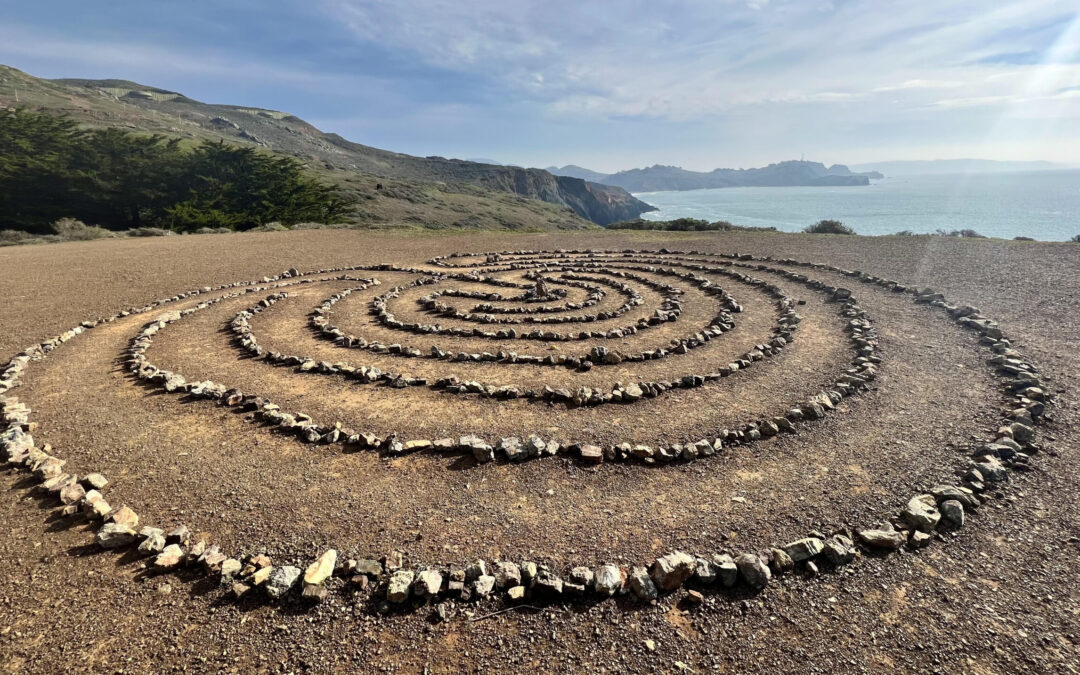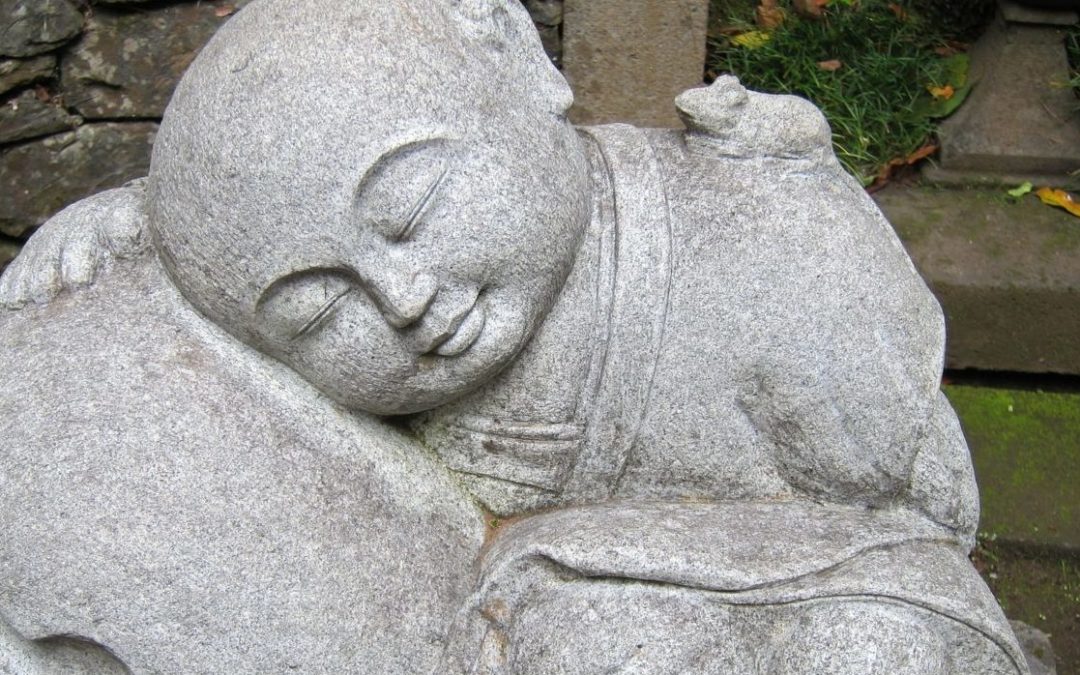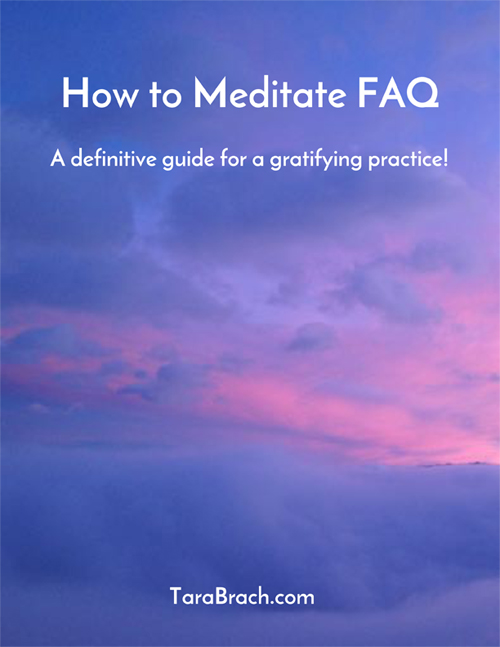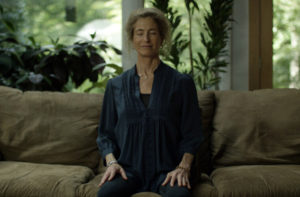Resources: Community Wisdom on Sleep

Your collective wisdom is so valuable and inspiring, we wanted to share it!
We have divided the responses into two categories:
- Meditative practices and basic wisdom that help us relate to sleeplessness
- A list of support strategies (herbs, music) that were identified
Please be aware that we are not making any claims about the efficacy of these strategies; rather, we are sharing what friends in our broader community have found helpful.
We hope you’ll find this a rich banquet of collective wisdom! (read more)
In addition, below are some meditations and talks to help in quieting your mind, relaxing your body, and bringing peace to your heart.
You might also check out Mindfulness for Anxiety and Sleep: Learn Practices that Help Reduce Stress and Calm Fears – an online on-demand course offered by Tara.
Talks to Help You Sleep

Part 2 – Healing Anxiety – How Meditation Frees Us
Anxiety and the fear of failure is a pervasive suffering around the world. It is also increasing—along with the pace of life, over-consuming, addiction, noise, polarization and...

Part 1 – Healing Anxiety – How Meditation Frees Us
Anxiety and the fear of failure is a pervasive suffering around the world. It is also increasing—along with the pace of life, over-consuming, addiction, noise, polarization and...
Meditations to Help You Sleep

Meditation: Relaxing Back into Awareness (20:12 min.)
When we fully inhabit our body, we discover the space and wakefulness of awareness itself. In this meditation, we rest in this open awareness, and when the attention narrows into...

Meditation: Relaxing with Life (23:01 min.)
This meditation includes a mindful body scan and guidance in relaxing with the changing waves of experience. When we say “Yes” to the moment, we open to the sea of awareness that...

Meditation: Relaxing into Presence or Sleep (15:37 min)
This meditation can help us to access a relaxed attentiveness, or alternately, serve as a pathway to ease-filled sleep. Photo credit: Shannon Lavery, Rodeo Beach - Marin County,...

Meditation: Relaxing Back into Awareness (21:28 min.)
When we are in our daily trance, we are often leaning forward, on our way somewhere else. In this meditation we are guided to relax back into the awareness that is always,...

Meditation: Reducing Anxiety and Getting to Sleep (18:00 min.)
Many of us struggle with anxiety, and spend hours in bed wishing we could turn off our mind and get to sleep. This podcasted series of 3 guided meditations - 6, 12, and 18...

Meditation: Reducing Anxiety and Getting to Sleep (12:00 min.)
Many of us struggle with anxiety, and spend hours in bed wishing we could turn off our mind and get to sleep. This podcasted series of 3 guided meditations - 6, 12, and 18...

Meditation: Reducing Anxiety and Getting to Sleep (6:52 min.)
Many of us struggle with anxiety, and spend hours in bed wishing we could turn off our mind and get to sleep. This podcasted series of 3 guided meditations - 6, 12, and 18...

Meditation: Relaxing Back into Awareness (20:04 min.)
When we fully inhabit our body, we discover the space and wakefulness of awareness itself. In this meditation, we rest in this open awareness, and when the attention narrows into...

Meditation: Relaxing by Day, Sleeping at Night (no bell at end) (14:23 min)
More than one-third of adults in the U.S. don't get enough sleep, and studies have shown that mindfulness can make a positive difference. When we effectively quiet the mind and...

Meditation: Relaxing into Presence (14:46 min)
Meditation - Relaxing into Presence (bell at end) This meditation can help us to access a relaxed attentiveness, or alternately, serve as a pathway to ease-filled sleep....
Community Wisdom on Sleep (Continued from top)
We have divided the responses into two categories:
- Meditative practices and basic wisdom that help us relate to sleeplessness
- A list of support strategies (herbs, music) that were identified
Please be aware that we are not making any claims about the efficacy of these strategies; rather, we are sharing what friends in our broader community have found helpful.
We hope you’ll find this a rich banquet of collective wisdom!
Meditative Practices:
ATTITUDE
I had insomnia as a child and it still crops now and again. I return to the advice my pediatrician shared with me: No big deal. Your body can still get lots of rest even when you can’t fall asleep. You’ll be ok tomorrow, even if you’re a little tired. He taught me how to do a body scan to “keep my brain busy” (in lieu of worrying, which I did a lot of). Basically, taking the pressure off usually allowed me to relax and eventually fall asleep.
Insomnia is like a Chinese finger trap, the more I fight it the more I get stuck. So I try to not get anxious about not sleeping and just accept that at least I’m resting my body and that’s good enough.
When nothing’s worked over years of insomnia, I’ve learned to not be afraid of it, to accept it. When I wake up at 3 AM I’ll put a hand on my heart, or listen to the sounds of the night. Beats fighting it!
I’ve gotten to the point where I just let it be and accept it. There’s a part of me that now enjoys the solitude and quiet that can be found in the middle of the night.
ANXIOUS THOUGHTS
I remind myself that my thoughts are usually more irrational and very fear based in the middle of the night and I try to breathe into it and remind myself that I will feel better once I allow myself to fall back asleep, as I usually see things a bit differently and better in the morning.
I find when anxious cyclical thinking disrupts my ability to rest, I will intentionally recount and envision memories that filled me with peace. Each time I feel the anxious shadow draping over me, I speak to it, telling it I see it, I love it. I picture myself cradling it like a baby, rocking it with compassion.
When I become aware that I’m in the old habit of ruminating, I begin repeating thank you. The gratitude can be focused on anything—my warm bed, healthy kids. Just coming back to thankfulness helps me untangle and relax into sleep.
I find it helps to visualize putting the thing I’m thinking about in a drawer and sliding it shut until tomorrow. If I can picture “putting it away”, it allows me to let it be.
What I’ve been doing recently is to embrace my anxiety or whatever it is that doesn’t let me sleep. I identify what it is that needs to leave my system and let it be—work, family, whatever. I let my anxious-self talk to my “wanting to sleep” self. I usually find myself surprised in the morning at how fast I ended up falling asleep.
I visualize my blanket as a warm golden shield to protect me from anxiety and fear. I also try to visualize a warm golden light under me to help me focus on areas in my body that are not flared with pain.
GRATITUDE AND METTA (LOVINGKINDNESS)
Going to sleep doing a loving kindness meditation. It shifts my focus and energy.
I go through the alphabet, try to list someone I’m grateful for under each letter and send up a tiny prayer for them.
I let my mind go to the thousands of people who are awake in their beds at the same time as me and send metta to this community of “sleep challenged night watchers”. We’re the ones that make sure everyone else is able and safe to sleep.”
I talk to all the cells in my body and tell them that they are bathed and surrounded in love, and that all is well.
List today’s blessings before sleeping, a conscious inhale & exhale (letting go) and smile with hand on heart.
I list things I am grateful for starting with my pillow, my comforter, the person sleeping beside me. I feel the weight of my bones sink into comfort.
SELF-COMPASSION
It can be helpful to gently cross my hands over my chest (a la Mindful Self Compassion, stimulating oxytocin), adopt the half smile (Thich Nhat Hanh), and cuddle into the comforter. This seems as if it generates the feeling of being a safe, held, very young child. Sometimes breath counting helps as well, or using Thich Nhat Hanh’s “calm, smile” coordinated with the breath. If all else fails, lovingkindness meditation for as long as I am awake.
I use compassionate self-talk/mantras: It’s ok to sleep. You’ve done enough for today. It’s ok to close your eyes. May I rest with ease, etc.
HOW YOU GO TO SLEEP
I learned from someone who taught at Stanford and worked with neurologists that you often wake up the way you go to sleep. She told us that the mind “prunes” itself after you sleep and that by focusing on positive visions for the next day, you’re bound to wake up in a rested, calm, happier state. I’ve tried this and it works. Apparently this is the case with anesthesia as well; my friend who is an anesthesiologist tries to keep people calm going into it, because that’s how they’ll wake up.
When you wake up in the middle of the night, play possum. Don’t move a muscle. And concentrate on your breath. Hopefully you’ll never fully wake up & slip right back to sleep.
Acknowledging that I have sleep issues has been helpful. Also, recognizing when it feels like work. I will take a break and get out of bed. Sometimes I’ll wash my face or brush my teeth again so my brain is reminded of my sleep routine. Then I will get back into bed and try again.
Ironically, I listen to Tara’s podcasts when I can’t sleep and not because they are boring, honestly! It’s because her voice is soothing to me and the concepts she covers remind me that my fears are part of the human experience. I’m not alone.
I visualize the most comfortable and protective space I can imagine and lay down in it. Mine happens to have a dark purple light glowing from the space so I let the light hug me.
If you are still awake after 30-40 mins, get out of bed, but keep everything “slow and dumb and dark”. Lights on low in the house with quiet. No planning, working, housework, or problem solving. No screens of any kind. A self-indulgent book that is not heavy or highly intellectual or a slow walking meditation is okay. Try some warm herbal tea. After 10-30 mins max, back in bed. Repeat.
I start with concentrating on the big toe of my right foot and slowly move around my whole body putting each part to sleep, letting it go and moving on. I’m usually asleep before I finish.
Doing a Body Scan knocks me out every time.
Progressive relaxation, which is essentially contracting muscles and then releasing, starting with the feet and moving through my whole body, part by part. Breathing in, holding my breath while contracting and then breathing out while letting go. My insomnia is usually accompanied with what I call “3 am thoughts”. They swirl around with everything from my to-do list to a litany of mild traumas mined from a lifetime of memories! Getting back into my body helps calm my mind and get back to sleep.
CALMING BREATH
I try Dr. Andrew Weil’s 4-7-8 breathing technique…inhale for a count of four, hold for a count of 7 & exhale for a count of 8.
Breathe in for a count of four, hold for a count of four, exhale for a count of four, hold for a count of four.
Mantra: In – Out, Deep – Slow, Calm – Ease, Smile – Release, Present Moment – Wonderful Moment.
If/when I wake up during the night, I do slow deep breathing (out-breath longer than in-breath) with one hand on belly & the other on chest. This is very calming, as well as not “making wrong” my experience! Self compassion. Acceptance.
My go to for getting to sleep is silently counting backwards from 2000 and breathing with the counting.
LIFE HABITS
After years of sleep struggles, I finally accepted that I needed to stop drinking alcohol completely. I drank a glass at night but my body was rebelling and I would wake again in the early morning with anxiety and headache. I quit 3 years ago and sleep better than ever. Alcohol was hiding my anxiety. I have used mindfulness and contemplative practices to deal with years of pain that I was numbing with alcohol. I feel like I am a new person and I sleep like a baby.
It’s really important what I eat for dinner—veggie soups and light food, not after 7pm, helps me to sleep well. It really makes a difference.
Lavender oil on my pillow and pulse points, soothing music and reiki—especially on the heart and stomach—and sometimes listening to yoga nidra instructions, all help me when I am facing sleeplessness. Also maintaining a sleep hygiene journal, walking on the beach in the evening, and eating a light carbohydrate snack a few hours before sleeping. And a day time massage. All these start helping in a few days to bring the anxiety and sleeplessness under control.
Progressive muscle relaxation, followed by setting an intention and body scan meditation.
Setting an alarm reminder at 7-8 pm to transition from work to time to unwind mode.
I get up, run a shallow lukewarm bath and sit my feet in it. I slowly cool the water down with just a trickle of cold water and focus on the sensations and sound. This allows my mind to quiet. Sometimes I add lavender to the water and sometimes I place my hands in the water. I do this for 10 to 30 mins and I go back to bed and off to sleep!
Honoring our natural circadian rhythms. For waking up in middle of the night and not being able to go back to sleep, get outside for at least 15-30 min in the mornings, preferably before 10.
ELECTRONICS
These may be obvious: no screens in the bedroom, leave phone in charger in another room. And try to wake up at the same time everyday
Hands down the biggest help for me recently has been leaving my phone in another room and using a real alarm clock to wake up. I used to have the phone plugged in next to my bed, and something about it being there kept it tethered to my brain all night. If I woke up and was anxious about something, I felt like I could fix it in the moment by sending an email or searching for something on the internet. Now it’s literally out of sight, out of mind while I’m sleeping. I feel like I reclaimed my bedroom as a place for sleep only!
Not looking at any kind of screen, especially phone, for 2 hours before bed. Pitch blackness in room and, ideally, silence. And taking away the pressure. I’m lying in bed, and that’s restful too—even if not sleeping. Remembering sleep just happens, it’s not something you “do”.
Very practical advice my doctor gave me was to not look at the clock when you wake up in the middle of the night. This has helped me tremendously! That eliminates the stress of “oh… it’s such and such o’clock… I have to wake up soon…I really need to fall asleep right now or else.” One less worry on your mind at night.
Support Strategies (Remedies):
- Exercise, yoga, yoga nidra, meditation, journaling, massage, reiki
- Listening to guided meditations, talks, instrumental music,
- Magnesium, lavender bath and oil, CBD oil, calming herbal teas, aromatherapy, Kava Kava root tincture, melatonin, Epsom salt baths, body pillows, weighted blanket
- No caffeine or alcohol toward end of day,
- Not looking at any kind of screen, especially phone, 2 hours before bed, blue blocking glasses, no screens in the bedroom, leave phone and charger in another room, sleep with WiFi OFF (avoid EMF’s)
- Try to wake up at the same time every day,
- Stick to self-care regimen during the day
- Binaural beats in ear buds, DELTA sounds
- White noise machine
- Bach Flower Remedies Sleep Aid
- Sleep study and CPAP machine
- Bellruth Napersak’s guided imagery on sleep

